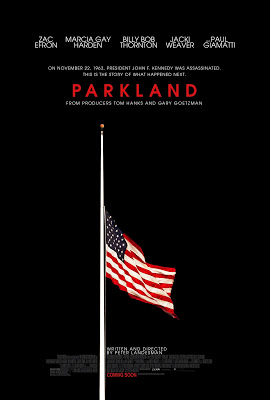W.H Auden once wrote ‘Death is the sound of distant thunder at a picnic’. Without engaging with the kind of morbid, existential chitchat this quote implies, the same can also be said about Peter Landesman’s Parkland. For, in spite of the intriguing premise this film offers, a look at one of history’s most pivotal moments through the eyes of characters at its periphery, the reaction it provokes is one so slight, so minimal that its existence is barely justified. For a feature that tries so desperately to catch the almost unfathomable atmosphere of a distinct point in time, a universal sense of shock and horror, Parkland fails to incite in us even the most basic of human responses. What ultimately transpires is a dull and unaffecting affair, one that slips from memory almost as soon as its credits roll.”
The events of November 22nd 1963, even to those who did not witness them directly, remain etched upon the global psyche as a point of unremitting loss and confusion. The widespread paranoia that came about as a result of John F. Kennedy’s assassination has been well documented since then, yet Parkland aims to offer a new insight into the collective emotions instigated by those few significant days. It offers a number of seemingly interesting viewpoints from sideline figures; the spectator who happened upon filming the assassination, the doctors who treated both Kennedy and assassin Lee Harvey Oswald, the unknowing brother of the killer, the detective who could have prevented the whole ordeal.
Through these characters, Landesman attempts to convey the complexity of emotion stemming from the event, marked by a visual style comprised of invasive, handheld camerawork and archive footage intending to produce a verité aesthetic. This is pushed along by a generally competent cast, including Marcia Gay-Harden, Billy Bob Thornton and a particularly remarkable Paul Giamatti as the bystanding documenter Abraham Zapruder. Elsewhere, Zac Efron is grossly miscast as a physician who looks like he’s spent the opening three hours of his day sculpting his hair to perfection.
And then it all starts to unhinge. The tense and chaotic atmosphere the film strives for is nowhere to be found, replaced instead by a monotonous and indifferent bundle of nothing. Its emotions are so neatly packaged that all it realistically tries to invoke is an insincere state of catharsis; and it even fails at doing that. It feels like a badly compiled youtube supercut of various people weeping in a series of unrelated scenarios. Fractured and unbound, it distinctly lacks any unifying thread to tie all of its narrative pieces together. What we’re left with is a jumbled, forgetful mess.
In many ways, Parkland is the worst kind of film imaginable, neither good nor bad enough to enact any form of response. And this is all so surprising when we consider its subject matter, as one of history’s greatest talking points. Sadly, there’s not much to think or talk about here. ‘Distant Thunder’ may even be an understatement.

